Daniel Madrigal Diaz
LEGOMem: Modular Procedural Memory for Multi-agent LLM Systems for Workflow Automation
Oct 06, 2025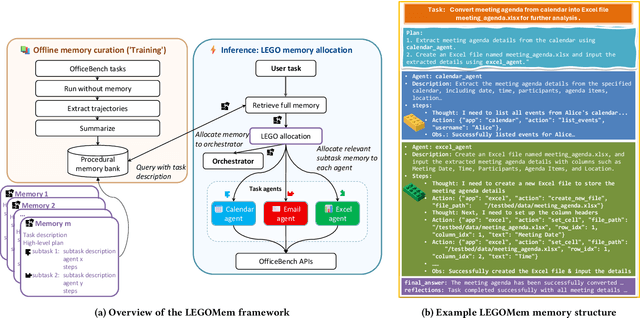

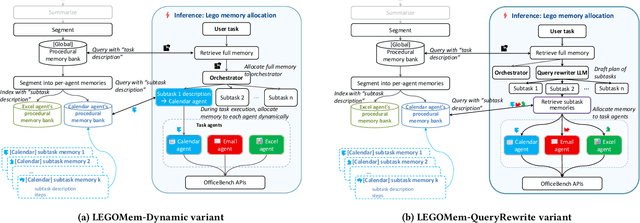
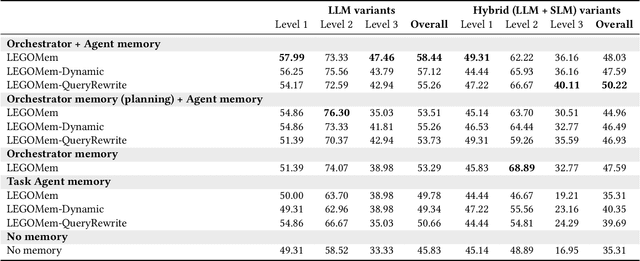
Abstract:We introduce LEGOMem, a modular procedural memory framework for multi-agent large language model (LLM) systems in workflow automation. LEGOMem decomposes past task trajectories into reusable memory units and flexibly allocates them across orchestrators and task agents to support planning and execution. To explore the design space of memory in multi-agent systems, we use LEGOMem as a lens and conduct a systematic study of procedural memory in multi-agent systems, examining where memory should be placed, how it should be retrieved, and which agents benefit most. Experiments on the OfficeBench benchmark show that orchestrator memory is critical for effective task decomposition and delegation, while fine-grained agent memory improves execution accuracy. We find that even teams composed of smaller language models can benefit substantially from procedural memory, narrowing the performance gap with stronger agents by leveraging prior execution traces for more accurate planning and tool use. These results position LEGOMem as both a practical framework for memory-augmented agent systems and a research tool for understanding memory design in multi-agent workflow automation.
OdysseyBench: Evaluating LLM Agents on Long-Horizon Complex Office Application Workflows
Aug 12, 2025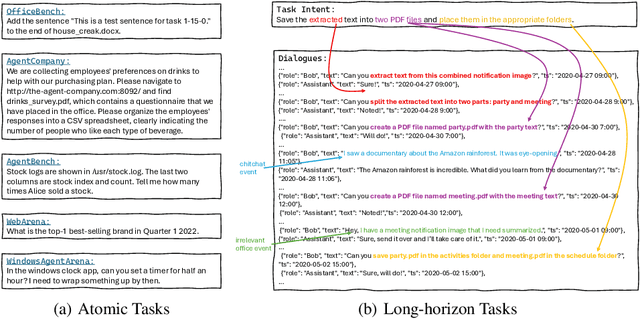
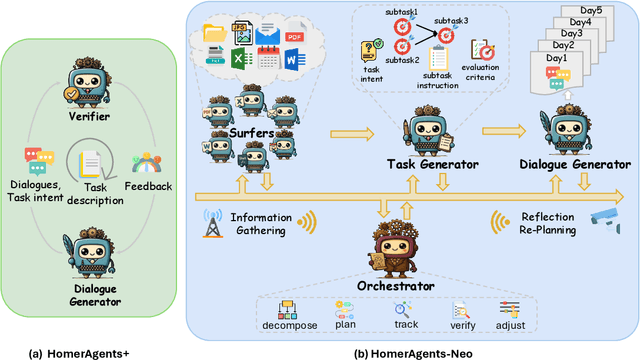

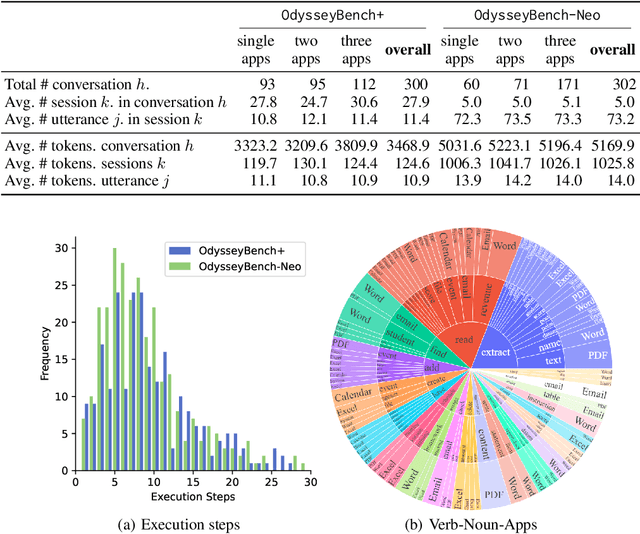
Abstract:Autonomous agents powered by large language models (LLMs) are increasingly deployed in real-world applications requiring complex, long-horizon workflows. However, existing benchmarks predominantly focus on atomic tasks that are self-contained and independent, failing to capture the long-term contextual dependencies and multi-interaction coordination required in realistic scenarios. To address this gap, we introduce OdysseyBench, a comprehensive benchmark for evaluating LLM agents on long-horizon workflows across diverse office applications including Word, Excel, PDF, Email, and Calendar. Our benchmark comprises two complementary splits: OdysseyBench+ with 300 tasks derived from real-world use cases, and OdysseyBench-Neo with 302 newly synthesized complex tasks. Each task requires agent to identify essential information from long-horizon interaction histories and perform multi-step reasoning across various applications. To enable scalable benchmark creation, we propose HomerAgents, a multi-agent framework that automates the generation of long-horizon workflow benchmarks through systematic environment exploration, task generation, and dialogue synthesis. Our extensive evaluation demonstrates that OdysseyBench effectively challenges state-of-the-art LLM agents, providing more accurate assessment of their capabilities in complex, real-world contexts compared to existing atomic task benchmarks. We believe that OdysseyBench will serve as a valuable resource for advancing the development and evaluation of LLM agents in real-world productivity scenarios. In addition, we release OdysseyBench and HomerAgents to foster research along this line.
Enhancing Reasoning Capabilities of Small Language Models with Blueprints and Prompt Template Search
Jun 10, 2025
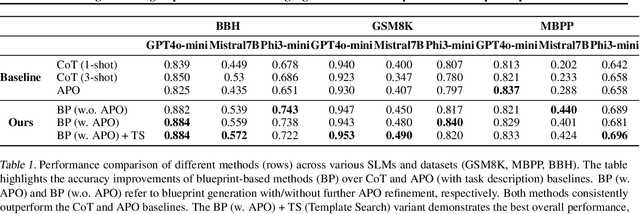
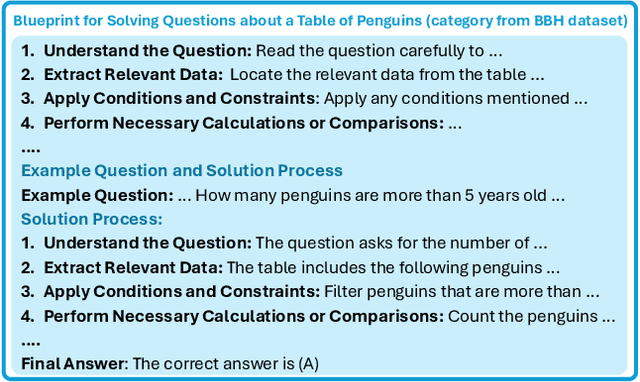

Abstract:Small language models (SLMs) offer promising and efficient alternatives to large language models (LLMs). However, SLMs' limited capacity restricts their reasoning capabilities and makes them sensitive to prompt variations. To address these challenges, we propose a novel framework that enhances SLM reasoning capabilities through LLM generated blueprints. The blueprints provide structured, high-level reasoning guides that help SLMs systematically tackle related problems. Furthermore, our framework integrates a prompt template search mechanism to mitigate the SLMs' sensitivity to prompt variations. Our framework demonstrates improved SLM performance across various tasks, including math (GSM8K), coding (MBPP), and logic reasoning (BBH). Our approach improves the reasoning capabilities of SLMs without increasing model size or requiring additional training, offering a lightweight and deployment-friendly solution for on-device or resource-constrained environments.
Exploring How LLMs Capture and Represent Domain-Specific Knowledge
Apr 24, 2025



Abstract:We study whether Large Language Models (LLMs) inherently capture domain-specific nuances in natural language. Our experiments probe the domain sensitivity of LLMs by examining their ability to distinguish queries from different domains using hidden states generated during the prefill phase. We reveal latent domain-related trajectories that indicate the model's internal recognition of query domains. We also study the robustness of these domain representations to variations in prompt styles and sources. Our approach leverages these representations for model selection, mapping the LLM that best matches the domain trace of the input query (i.e., the model with the highest performance on similar traces). Our findings show that LLMs can differentiate queries for related domains, and that the fine-tuned model is not always the most accurate. Unlike previous work, our interpretations apply to both closed and open-ended generative tasks
Project Florida: Federated Learning Made Easy
Jul 21, 2023
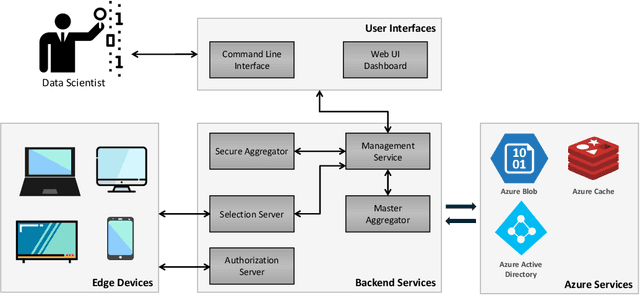

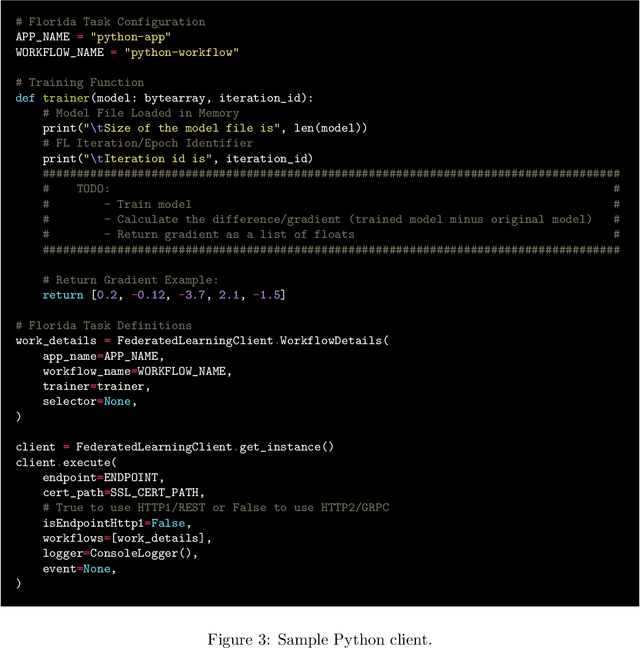
Abstract:We present Project Florida, a system architecture and software development kit (SDK) enabling deployment of large-scale Federated Learning (FL) solutions across a heterogeneous device ecosystem. Federated learning is an approach to machine learning based on a strong data sovereignty principle, i.e., that privacy and security of data is best enabled by storing it at its origin, whether on end-user devices or in segregated cloud storage silos. Federated learning enables model training across devices and silos while the training data remains within its security boundary, by distributing a model snapshot to a client running inside the boundary, running client code to update the model, and then aggregating updated snapshots across many clients in a central orchestrator. Deploying a FL solution requires implementation of complex privacy and security mechanisms as well as scalable orchestration infrastructure. Scale and performance is a paramount concern, as the model training process benefits from full participation of many client devices, which may have a wide variety of performance characteristics. Project Florida aims to simplify the task of deploying cross-device FL solutions by providing cloud-hosted infrastructure and accompanying task management interfaces, as well as a multi-platform SDK supporting most major programming languages including C++, Java, and Python, enabling FL training across a wide range of operating system (OS) and hardware specifications. The architecture decouples service management from the FL workflow, enabling a cloud service provider to deliver FL-as-a-service (FLaaS) to ML engineers and application developers. We present an overview of Florida, including a description of the architecture, sample code, and illustrative experiments demonstrating system capabilities.
FLUTE: A Scalable, Extensible Framework for High-Performance Federated Learning Simulations
Mar 25, 2022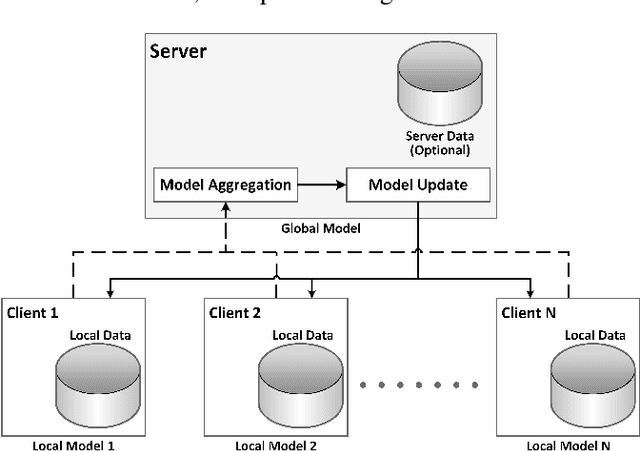
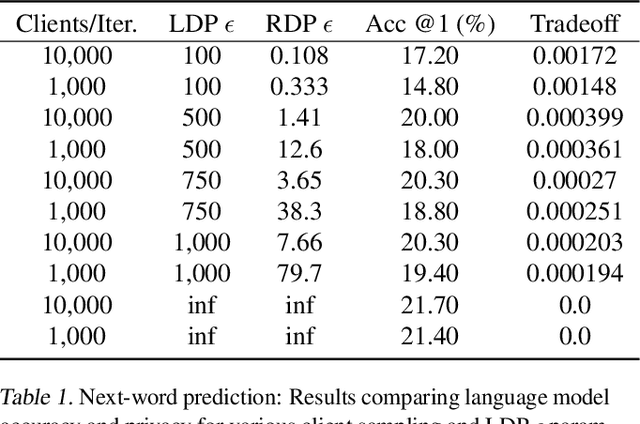
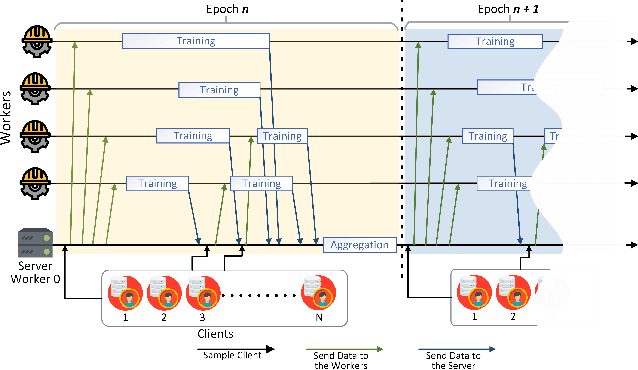
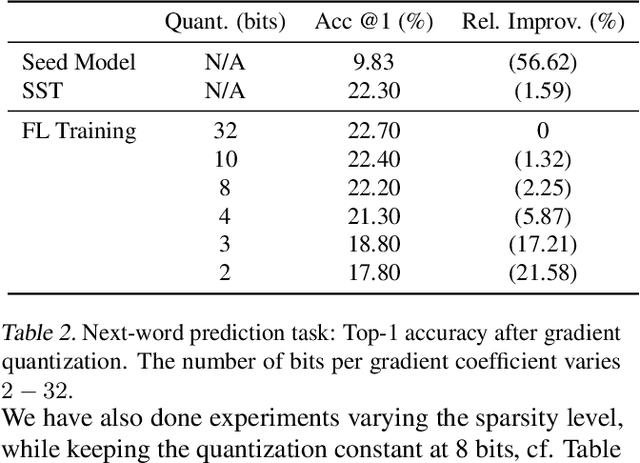
Abstract:In this paper we introduce "Federated Learning Utilities and Tools for Experimentation" (FLUTE), a high-performance open source platform for federated learning research and offline simulations. The goal of FLUTE is to enable rapid prototyping and simulation of new federated learning algorithms at scale, including novel optimization, privacy, and communications strategies. We describe the architecture of FLUTE, enabling arbitrary federated modeling schemes to be realized, we compare the platform with other state-of-the-art platforms, and we describe available features of FLUTE for experimentation in core areas of active research, such as optimization, privacy and scalability. We demonstrate the effectiveness of the platform with a series of experiments for text prediction and speech recognition, including the addition of differential privacy, quantization, scaling and a variety of optimization and federation approaches.
 Add to Chrome
Add to Chrome Add to Firefox
Add to Firefox Add to Edge
Add to Edge